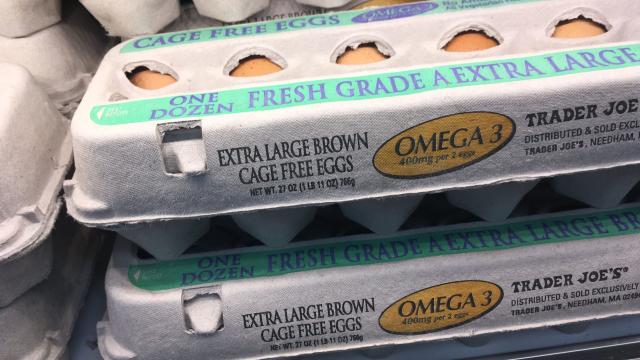Is cage-free better than organic? Are omega-3 eggs worth the extra money? Let’s break down the terms you’ll see on egg cartons.
Note: The below information was sourced from the US, but roughly comparable to Australian labeling practices and food laws.
- Organic: Hens that produce organic eggs can’t be in cages, and must have “access” to the outdoors (in other words, an open door; the amount of outdoor space isn’t specified). They must also eat organic feed (grown with only organic-approved pesticides and fertilisers) and their feed can’t contain ingredients made from chickens or mammals. Farms need to be certified organic to use the term.
- Cage free: The hens don’t live in cages, but can roam around the chicken house (a big structure like a barn) as they like.
- Free range, free roaming: The hens don’t live in cages and their houses have to have doors leading to the outside. They may not spend much (or any) time outside, but the eggs can be labelled free range as long as they have that access.
- Large, extra large, jumbo: This just refers to the size of the eggs. “Medium” eggs are fairly small to our modern eyes, and most recipes assume that your eggs are “large”. Claire Lower, our food and beverage editor, says: “Honestly I have never paid much attention to [egg size]. It probably matters in finicky recipes.”
- Pastured, pasture raised: There’s no official definition for this, but the label is meant to mean that the hens live outdoors most of the time.
- Omega-3: Eggs from pasture-raised hens tend to have more omega-3 fatty acids than those from conventionally-produced eggs. But usually the eggs labelled omega-3 come from hens that have been given an omega-3 supplement in their diet (often made from fish or from flaxseed)
The Terms That Don’t Mean Much
Sometimes you’ll see labels that aren’t meaningful at all – or people may describe eggs (for example, on a menu) in ways that don’t accurately describe what’s going on.
- Grass Fed: Chickens may live on grass (if they are pasture raised, for example) but they don’t actually eat grass. Instead, they’re mainly eating bugs and seeds.
- Hormone Free, No Added Hormones: Australian food laws don’t allow growth hormones to be given to chickens so this is a moot point.
- Brown: This literally just means they’re brown. Brown eggs aren’t more wholesome or natural. Some breeds of chickens just lay brown eggs.

Comments
One response to “What All Those Labels On Eggs Really Mean”
One dozen = 12